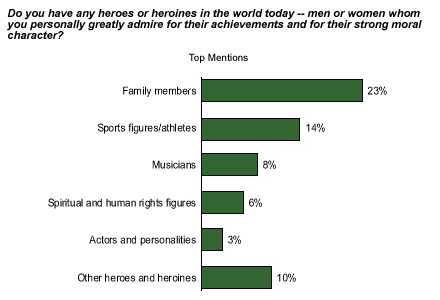Heroes don't have to live large to loom large in the minds of today's teen-agers. When Gallup asked teens in an October 2000 Gallup Youth Survey (GYS)* about their heroes or heroines, the names of countless sports figures, rock stars and other pop culture icons bubbled to the surface, but they are not the most admired. Family members (mother, father, grandmother, brother, etc.) leaped more readily to mind (23%), far ahead of sports stars (including Michael Jordan, Mia Hamm and Tiger Woods) (14%) musicians (including Janet Jackson and Eminem) (8%), and actors/television personalities (including Oprah Winfrey, Mel Gibson and Rosie O'Donnell) (3%).

But one group is noticeably absent from this most recent list: political and world leaders, many of whom tend to find perennial spots on Gallup's lists of the "most admired" man and woman among American adults.
According to the results of another GYS question that's been asked of 13- to 17-year-olds since 1979, "What one man/woman that you have heard or read about, living today in any part of the world, do you admire the most -- not including relatives or personal friends," it has been 14 years since world leaders topped the lists. In 1988, the top three most admired men were Mikhail Gorbachev, Ronald Reagan and Jessie Jackson. In that same year, the top three most admired women were Margaret Thatcher, Geraldine Ferraro and Nancy Reagan. Throughout the 1990s, teens' most admired figures consisted primarily of musicians, TV stars and movie stars.
Dr. Peter Gibbon, a research associate at the Harvard Graduate School of Education and author of a new book, A Call to Heroism: Renewing America's Vision of Greatness, endeavors to reinstate the concept of heroism at a time when it is easily confused with celebrity. Gibbon cites the GYS's more recent "most admired" lists of pop idols when he travels around the country talking with students and teachers about real heroes -- not "celebrities and superstars idolized for their wealth and fame." Gibbon tells kids, "Heroes must do something spectacular that is a model for others" and then explains why, by those criteria, Thomas Jefferson, Abraham Lincoln and Nelson Mandela make the cut but Sylvester Stallone doesn't.
Are there no political heroes left? Caroline Kennedy addresses that question in the introduction to a recently released collection of essays titled Profiles in Courage for Our Time, which tells stories of selfless acts of civic heroism. Kennedy says, "When we created the [Profiles in Courage] award in 1990, some doubted we would be able to find politicians worthy of the honor. They were wrong. This book tells the stories of men and women at all levels of government, in all parts of our country, across the political spectrum, who have all stood fast for ideals of America."
Key Points
If you add the percentages from the 2000 results in the graph above, you'll notice that the numbers don't add up to 100%. That's because a substantial percentage of teens told Gallup that year that they had no heroes or heroines. Political figures in particular seem to have lost their luster as objects of admiration among young people. On post-Sept. 11 surveys, firemen and policemen may well take well-deserved places on teens' lists of heroes. Future "most admired" lists will tell the tale.
*Findings are based on telephone interviews with a representative national cross section of 500 American teen-agers, aged 13 to 17, conducted August through October 2000. For results based on the total sample, one can say with 95% confidence that the maximum error attributable to sampling and other random effects is ±5%.